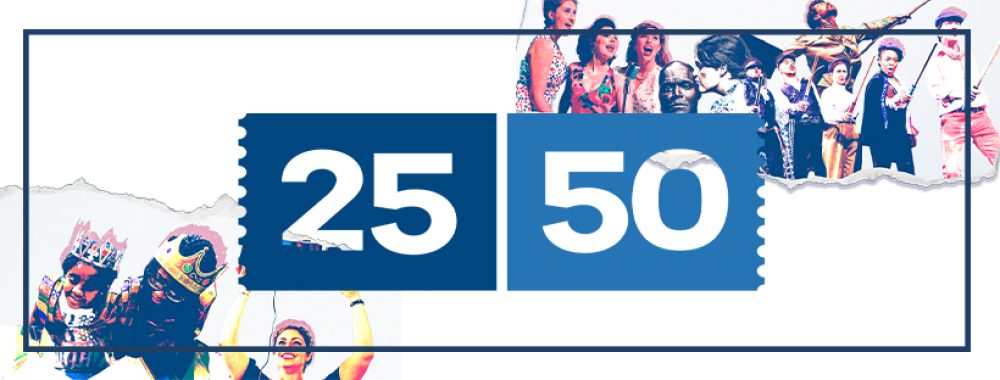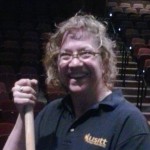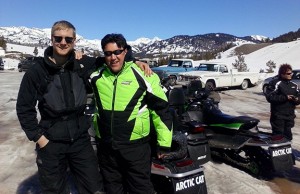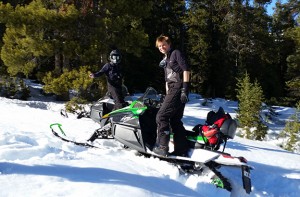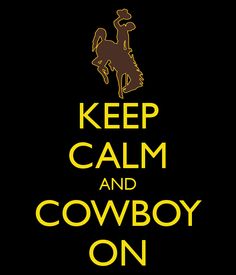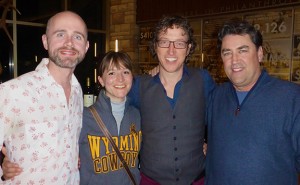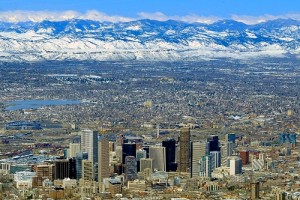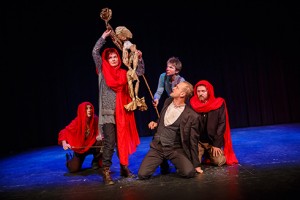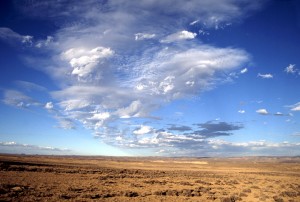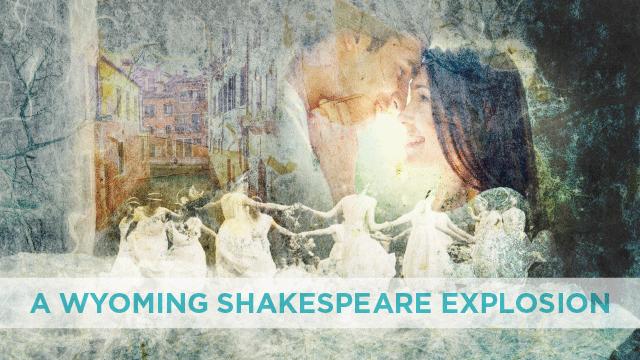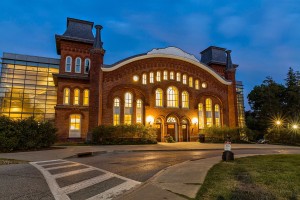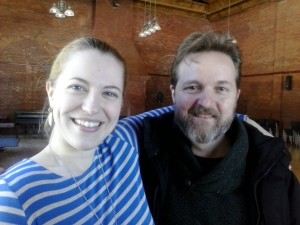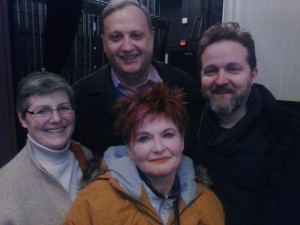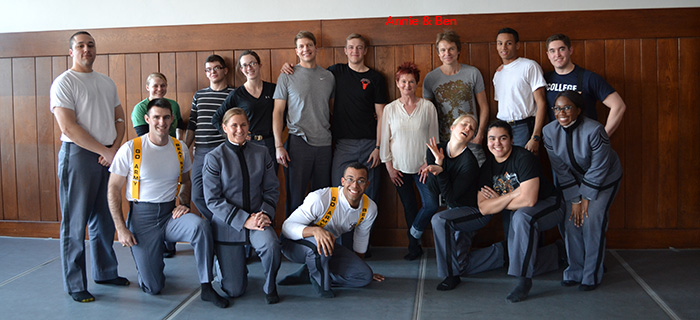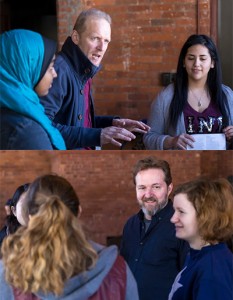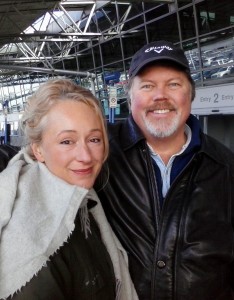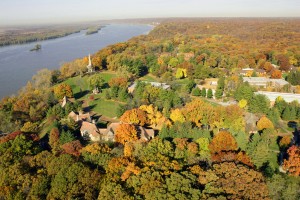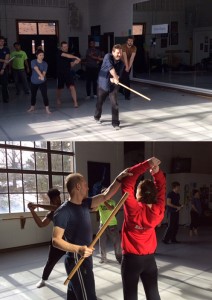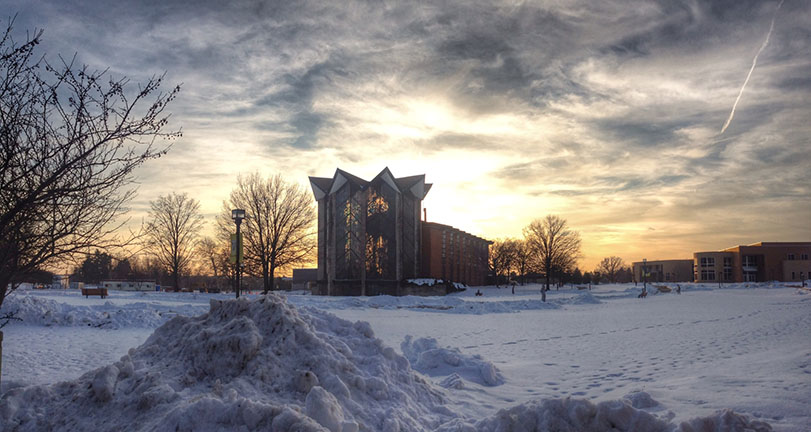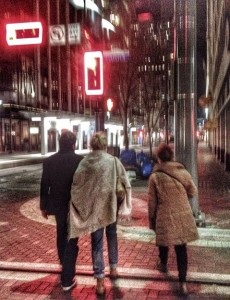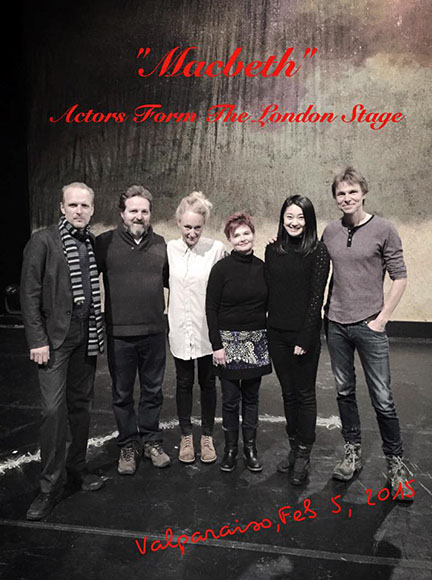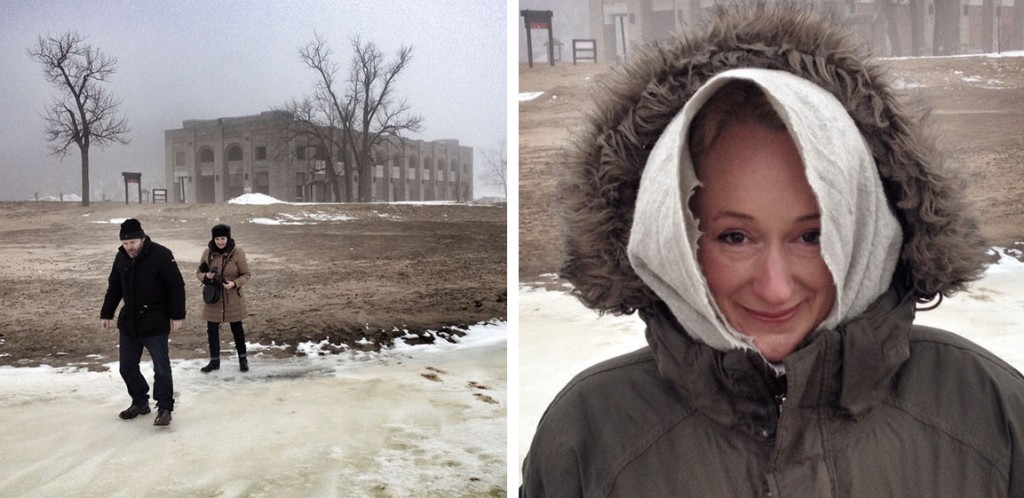One of the many great things about working with AFTLS is that it takes its actors to parts of the States they may not normally expect to see. The cities are exciting, the universities always interesting and unfailingly friendly, but this week was something new even to regular alumni such as myself. We headed off to the heart of Wyoming on a mini tour – three shows in three separate towns.
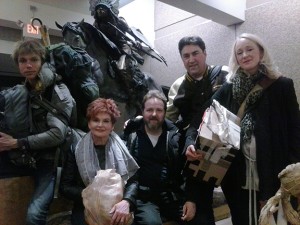
The cast (sans photographer Michael Palmer) and Leigh Selting next to a statue of Chief Washakie in the foyer of Lander High School.
Leigh Selting, the Head of Drama at University of Wyoming had arranged for us to perform Macbeth in Riverton, Lander, and Jackson Hole. We checked out of our hotel around midday and piled into the University’s large people carrier to set off toward Riverton. We ventured toward the mountains where herds of deer, tenuously angled rock formations and vast flat plains were all around us. Almost at every turn, not that there were many of those, one could just sit and look in a kind of reverie. Every so often, Leigh would throw in a nugget of interest – the name of a mountain, a river or some such.
Perhaps four hours later we got to Riverton where we checked into a hotel, which, curiously, had a swimming pool, right in front of reception complete with chairs and an umbrella to protect the sunbathers from the non-existent sun. I found the town rather characterful. Not sure some of the locals shared that interest, as ‘How did you people end up in Riverton?’ was a question we heard more than once. After dinner we decided to visit the Wind River Casino which is owned by the Northern Arapaho Tribe. Leigh settled down to a game of Black Jack from which he enjoyed a nice win. Skill or luck? He would say skill and he may be right, as myself and Charlie had no skill and even less luck betting wildly, desperately trying to hang on to thirty dollars at a roulette wheel. None of us could quite see the appeal of the casino but at least the profits go to the Arapaho so we felt we had contributed in some small way to their welfare.
Tuesday we gave a performance at Central Wyoming College, which featured a fabulous auditorium with around seven hundred seats, run by the delightful Chontelle Gray. The college was on Spring Break and we were concerned we may possibly be playing to a lone cowboy and his dog. Thankfully, well over a hundred came and were highly appreciative. I thought we gave a good show, and the acoustic for such a large theatre was fantastic.
 Wednesday we were at the Lander Valley High School where Diane Springfield who runs the Wyoming Shakespeare Co. gave us a nice welcome to a great theatre – the schools and colleges round here are served pretty darn well when it comes to theatre facilities. Again a lovely and listening crowd followed by a great response.
Wednesday we were at the Lander Valley High School where Diane Springfield who runs the Wyoming Shakespeare Co. gave us a nice welcome to a great theatre – the schools and colleges round here are served pretty darn well when it comes to theatre facilities. Again a lovely and listening crowd followed by a great response.
Things suddenly went from good to great. On Thursday we drove through the Teton Mountain range toward Jackson Hole, which is a famous and highly chic skiing resort with the small but perfectly formed town sitting at the foot of two huge ski slopes.
 Technically the town is called ‘Jackson’ named after a nineteenth century trapper and the ‘hole’ is the valley in which it sits. Apparently Harrison Ford lives here and had the poor chap not recently had a major mishap with his plane I would have expected to see him at our show. Or not. We went from hotel to motel – the Antler Motel (what better name for such a mountainous resort?) which had an almost log cabin quality which made us like it all the more.
Technically the town is called ‘Jackson’ named after a nineteenth century trapper and the ‘hole’ is the valley in which it sits. Apparently Harrison Ford lives here and had the poor chap not recently had a major mishap with his plane I would have expected to see him at our show. Or not. We went from hotel to motel – the Antler Motel (what better name for such a mountainous resort?) which had an almost log cabin quality which made us like it all the more.
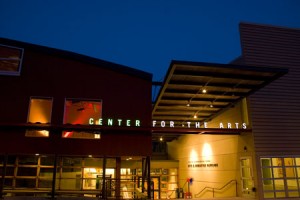 The Jackson Hole Center for the Arts is a new and beautifully designed arts complex with a theatre which looks smaller than its five hundred capacity. Once again a standing ovation. I like these American audiences.
The Jackson Hole Center for the Arts is a new and beautifully designed arts complex with a theatre which looks smaller than its five hundred capacity. Once again a standing ovation. I like these American audiences.
The following day Leigh had arranged through an ex student of his, a very nice guy called Will Dunn, for us to go snowmobiling. Jo went off to spend the day skiing, which, by all accounts, she is extremely good at.
At the pick-up point, we clambered onto our various snowmobiles, which were large, powerful and to my mind potentially dangerous. Tenuously we inched forward and got up to speeds of maybe thirty miles an hour. Will’s gleaming red mobile was plainly built for speed and he flew around us in something of a blur. Leigh was also skilled, Ben took to it easily, Charlie and Annie had a kind of ‘tandem’ version, and I followed up the rear.
We were encouraged to leave the path and try our newfound skills off road. I gave it a go and felt rather ‘Bond’ like for a minute or so till I got stuck in a drift and fell off. Embarrassed I waved my arms as it to say, ‘no problem’ but I was genuinely stuck. This bit of the experience I could have well done without. Particularly as it happened again half an hour later. On that occasion Ben arrived to help and he got stuck next to me. Stay off the soft snow apparently although I found it impossible to tell the difference visually. After a ten mile ride we arrived at a hot spring in which we were able to take a dip. It was slightly surreal, rather like having a bath up a mountain. Do we have to go back, can’t we just stay here? Back we went however, and by the time we got to Jackson we were pretty exhausted. Stimulation overload. That evening we took Leigh out for dinner as a thank you for organizing such an incredible week.
The six hour drive back was yet again over moon-like panoramas and dizzying rock spectacles. Well worth the drive if any reader of this is up for it. What other job would take us through the heart of Wyoming, the Teton mountains and hot springs? So, yet again, a huge THANK YOU to Leigh Selting, a brilliant, friendly, and supportive Coordinator without whom the tour wouldn’t have happened.
